 Of Women, Wisdom and the World
Of Women, Wisdom and the World
One of the leading feminists from the South, Kamla Bhasin shared her thoughts about fundamentalisms, Obama, the United Nations, the World Social Forum, feminism and much more. Unperturbed by a plane to catch and a sore throat, the woman was as inspiring as ever, pointing out the hope that we all have to live for.
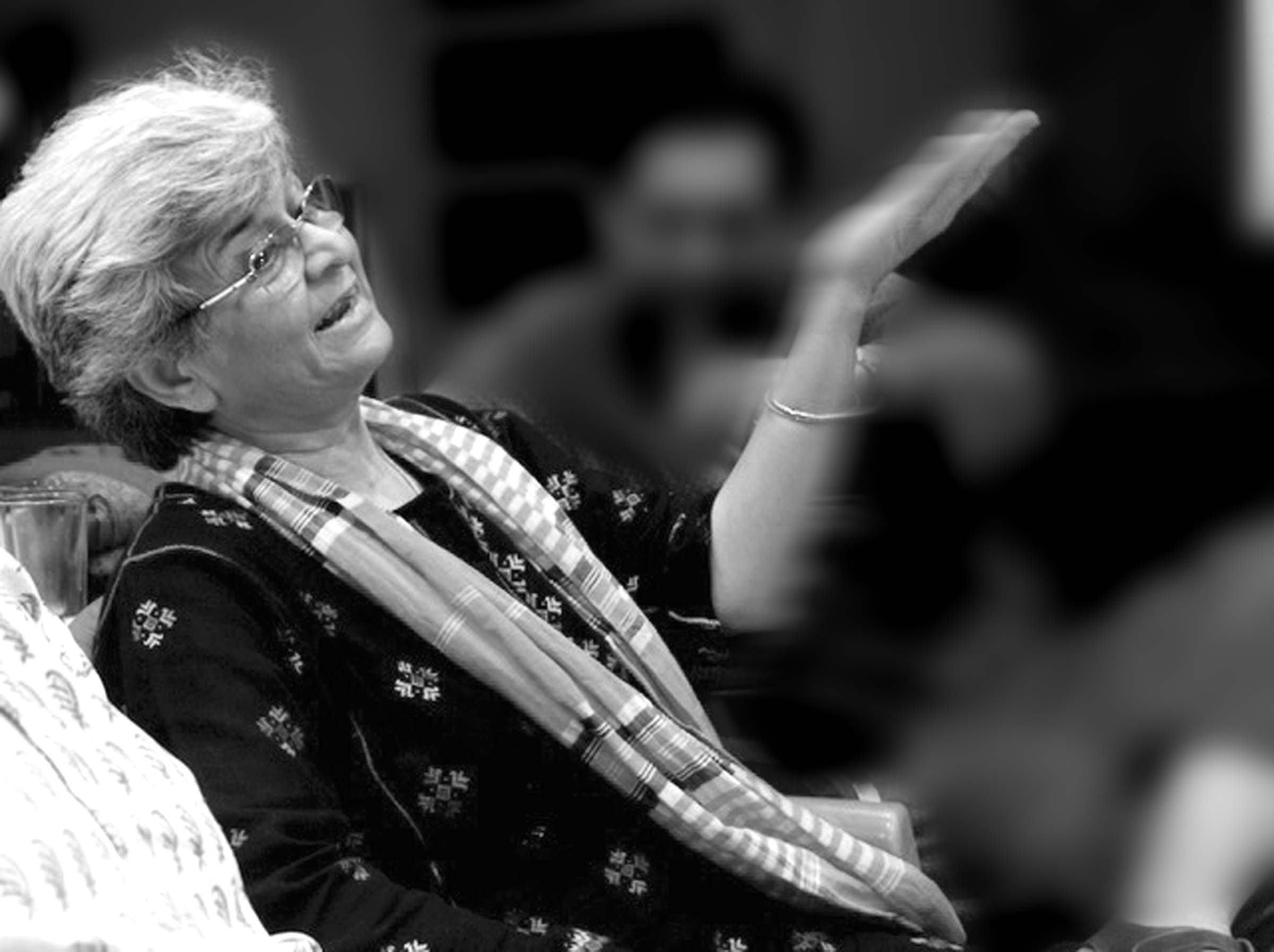 How would you assess religious fundamentalisms, particularly their impact on women’s citizenship, identities and bodies?
How would you assess religious fundamentalisms, particularly their impact on women’s citizenship, identities and bodies?
The first thing I want to say is that we are talking of all religions, not just Islam which most people focus on these days. Christian fundamentalism, Hindu fundamentalism and Muslim fundamentalism are all brothers in arms and they all conspire to keep women down. I also believe that all these modern religions are patriarchal in nature. But they all started [with the goal] of improving human life, social relations among people, creating certain rules for human beings to follow. They started with a very good purpose but they were also started by people in power.
Burma: Badly Battered but Believing
Long-time free Burma campaigner Debbie Stothard talks about the fear, suffering and frustration of the Burmese people who have endured the excesses of the junta regime. She tells us how Burmese women and their communities remain courageous and hopeful for better days, for freedom.

The Tragedy of Thai Democracy
Five years ago, Thailand had a thriving and developing democracy with freedom of expression, a relatively free press and an active civil society where social movements campaigned to protect the interests of the poor. Today, the country is creeping towards totalitarianism.
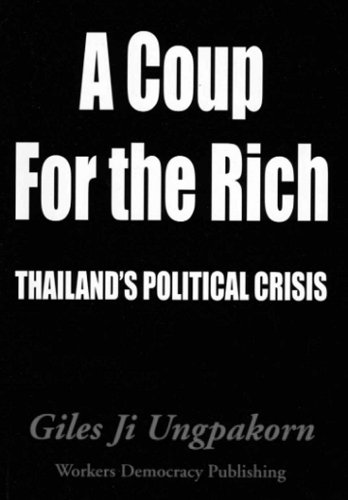
Controversy by Censorship. In A Coup for the Rich, Giles Ji Ungpakorn analysed the background and implications of the military coup that usted former Thai Premier Thaksin Shinawatra. The book not only dissected the distress of the country’s elites over the popularity of Shinawatra’s regime but also uncovered the subtle yet full support of the monarchy of such a political takeover, which closure continues to pervade present Thai politics.
The government, led by the mis-named Democrat Party, is only in power because of the military who staged a coup in 2006. The army ripped up the best constitution Thailand ever had and replaced it with their own one.
The government is vicious and paranoid. Its priority is to stifle dissent by using the lese majeste law. Anyone who criticises the government or the army is deemed to have insulted the King. They are censoring the electronic media and community radio stations and are encouraging citizens to inform on each other. People are being arrested after their computer IP numbers are traced. They are thrown in jail, before trial, for posting comments on the internet. The TV and print media are already working hand in glove with the military.
The courts have been used as an instrument of dictatorship, repeatedly dissolving the party that won most of the popular vote. Judges protect themselves by threatening anyone who dares to criticise them with a jail sentence for “contempt of court.” They claim that anyone who criticises the courts is criticising the King. Lese majeste trials are given little publicity and society cannot find out what actions are deemed to have insulted the King.
There is no transparency and accountability, no justice, no freedom of speech and no academic freedom.
In early 2007, I published a book called A Coup for the Rich. This short academic book was written as a protest against the shrinking democratic space in Thailand. I tried to analyse what exactly was happening to Thai democracy. I criticised the gross human rights abuses of the democratically elected Thaksin government. Thaksin presided over extra judicial killings in his so-called war on drugs and in the three southern Muslim provinces.
How can there be academic freedom when my own university, Chulalongkorn University, gave my book to the police? How can there be academic standards if political scientists like myself are not allowed to discuss what the King, the army and the elites do?
But I argued that a military coup was not the answer. Those people in society who supported the 2006 coup included most of Thai academia, over half the non-government organisations (NGO) movement and the missnamed “Peoples Alliance for Democracy” (PAD). The military and the PAD constantly claimed legitimacy from the King. Because I discussed all this, I was charged with lese majeste or insulting the King.
How can there be academic freedom when my own university, Chulalongkorn University, gave my book to the police? How can there be academic standards if political scientists like myself are not allowed to discuss what the King, the army and the elites do?
After the 2006 coup, the PAD soon descended into a fascist type of organisation. It took on an ultra-Royalist and ultranationalist politics. Its supporters wore Royal yellow shirts. It nearly caused a war with Cambodia over an ancient hill-top ruin. It built up an armed guard who openly carried and used weapons on the streets of Bangkok. They took over Government House, closed parliament and then moved on to occupy the two international airports. They were backed by the army and the elites including members of the Royal Family.
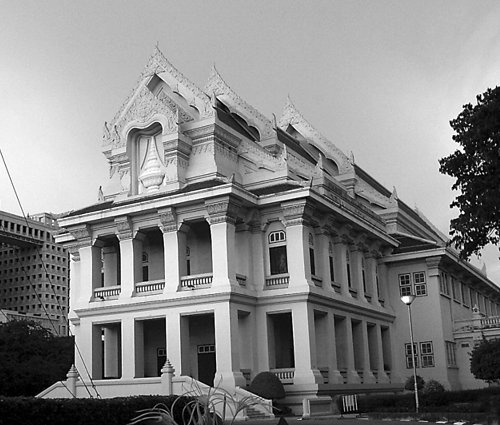
Tied to the Ground. Chulalongkorn University, Thailand’s leading educational institution relented to the authorities when A Coup for the Rich caused a stir. Its lecturer, the author eventually had to flee to Great Britian.
Photo by Carnopus from Wikimedia Commons.
The present Thai Foreign Minister is a PAD supporter who took part in the illegal occupation of the airports. The PAD’s media outlet, Manager Group have started witch hunts against academics and social activists who question the deterioration of democracy and question the use of lese majeste. It encourages people to commit acts of violence against those who think differently. The civil war which is developing in Thailand is a class war between the rich and the poor. But it is very distorted and complicated. Those “Yellow Shirts” who backed the coup and the subsequent undemocratic measures hated the fact that Thaksin’s Thai Rak Thai government won huge support for providing universal health care and public projects to lift people out of poverty.
Their excuse for backing a coup was to say that the electorate, especially the poor, had been bribed and were too stupid to deserve the right to vote. They want a rigged parliament where the poor only get to vote for a few MPs . They call this the “New Order” or “New Politics.”
Yet, Thaksin was no socialist and his was a party of Big Business. He was modernist and believed that the poor should become stakeholders in society. Since his overthrow and as a result of the prolonged crisis, a grassroots “Red Shirt” movement has developed. It is now being built by ordinary citizens who want democracy and freedom. They are moving beyond Thaksin.
Letter In April 2009, Suwicha Thakor was sentenced to 10 years imprisonment under the 2007 Computer Crime Act and lese majeste laws, after allegedly posting altered photographs of King Bhumibol Adulyadej on the internet. As a result of an international clamour over the harsh penalties for lese majeste violations, Thailand appointed Kittipong Kittayarak as permanent secretary of the Ministry of Justice to oversee lese majeste cases in January 2010. However, it is said that Suwicha is unlikely to benefit from this development. 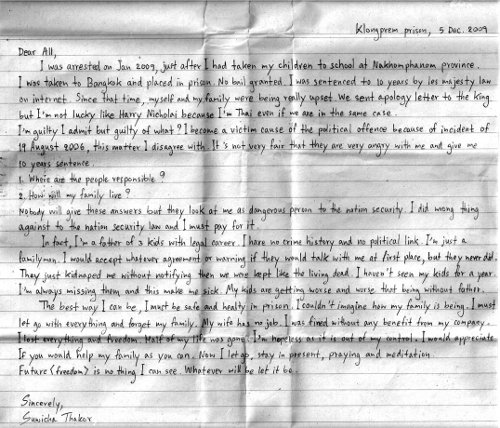
In his article “Thailand’s ‘New’ Approach to Lese Majeste,” Frank Anderson wrote, “Unfortunately for those now in prison, Kiitipong seems not to have been chosen for his compassion or his embarrassment over injustice meted out to the undeserving as much as for his status-quo leanings.”
In January 2010, Reporters without Borders obtained a copy of Suwicha’s letter, written in prison. Part of it reads: “We sent [an] apology letter to the King but I’m not lucky like Harry Nicholai because I’m Thai even if we are in the same case…They look at me as [a] dangerous person to national security.” Nicholai is an Australian author who was likewise charged with lese majeste but was extradited.
Sources: Anderson, Frank (19 January 2010). “Thailand’s ‘New’ Approach to Lese Majeste.”; Reporters Without Borders. (3 April 2009). “Internet user gets ten years in jail for posting content that ‘defamed’ monarchy.”; and Thakor, Suwicha. (5 December 2009). (Letter from Prison).
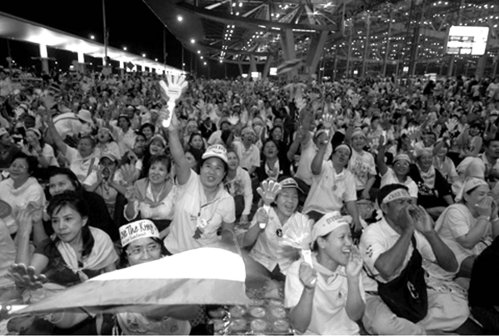
Airport Protest. At the tail end of November 2008, supporters of the monarchy and military-backed People’s Alliance for Democracy gathered at Suvarnabhumi airport, one of Asia’s more important transportation hubs, stranding more than 100,000 travelers and hurting the country’s tourism industry. But months before this, PAD supporters were milling at strategic sites in Bangkok such as the Government House. Driven by Thailand’s middle class, such gatherings were broadcast live over the television owned by a PAD leader and media mogul.
Source: Roberts, John (1 December 2008). “Airport occupations bring Thailand to political breaking point.”
What is also amazing is that this is becoming a Republican movement because of the actions of the military and the PAD in dragging the Monarchy into politics. The King has never once spoken out against the destruction of democratic rights and allows people to crawl on the ground in front of him. He has had the arrogance to lecture the poor that they must find “sufficiency” in their poverty. He was recently named as the richest monarch in the world.
The army, the conservative elites and the Democrat Party have no democratic legitimacy, so they cling to the coat-tails of the Monarchy instead. They are frightened that this Royal legitimacy is quickly evaporating and at a time when the King is getting very old. His son is held in contempt by the population because he is known as a thug who parades his wife naked for video snap shots. Most Thais have seen these videos and photographs.
One worrying question is why most academics support the military and the PAD. Equally worrying is why decent NGO activists and some trade unionists did so too. As far as the academics are concerned, even those claiming to be “liberal” were always elitist. Most believed that the problem of Thai democracy was the fact that the poor lacked education. But the education system that these academics have promoted is one where students learn everything by rote. The idea that an essay in politics might discuss arguments, rather than be merely descriptive, is met with surprise.
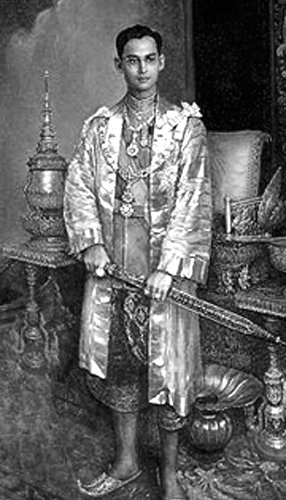
The King. Bhumibol Adulyadej, the world’s longest serving leader and monarch is a revered figure in Thailand. Although he himself decried the neardivinity that many people attribute to him, the government has yet to soften its stance on lese majeste – a trend that is hardly surprising given the very tenuous state of Thai politics.
Photo from Wikimedia Commons.
The NGO movement has a different problem. It is a movement which turned its back on politics and concentrated on singleissues and lobbying governments of any shade and colour. The movement swung from admiration of the Thaksin government to supporting the military coup. In a nutshell then, the old groups in civil society have helped to create the monster of the “New Order” that is now strangling Thai Democracy.
A new civil society is emerging from the Red Shirt movement. Many will feel uncomfortable that this is a movement of ordinary citizens and not the middle class. But this is what is really required to build a democratic society with social justice.
We need to cut down the military’s influence in society, reform the judiciary and the police and to expand freedom and democracy from this grassroots movement. And we need to rethink the Monarchy too.

A Changing but Still the Same World: A Conversation with Noam Chomsky
One of the foremost activist intellectuals, Noam Chomsky shares his reflections on the United States, neoliberalism and the media and their role in disrupting the world and keeping it as it is. He tells us why we need to take our fate into our own hands.
How would you describe racism immediately after the 9/11 events? How different is it now compared to 2001?
There are some changes. One change is that there is a black family in the White House. That would not have been even imaginable ten years ago. Undoutedly, this has a psychological effect on black Americans as it gives them a sense that they are not as totally isolated from the mainstream as they were in the past.
On the other hand, the situation of African- Americans has become worse. There is a very high level of incarceration. The economic situation is much worse, hitting poor people the hardest. There is a very close race-class correlation so African-Americans are severely harmed by the economic recession far more than others.
And of course there is a backlash. There is a racist element in the angry demonstrations that are taking place. But it is a little hard to identify because the people who are involved in those demonstrations are people who have authentic grievances. They have been treated very badly during the last 30 years of neoliberal economics. Their incomes have stagnated, even declined. Their benefits which were never good declined. Their lifestyles are being threatened. And nobody has any answers for them.
How would you assess religious fundamentalisms, including Christian fundamentalism in the US in the post 9/11 period?
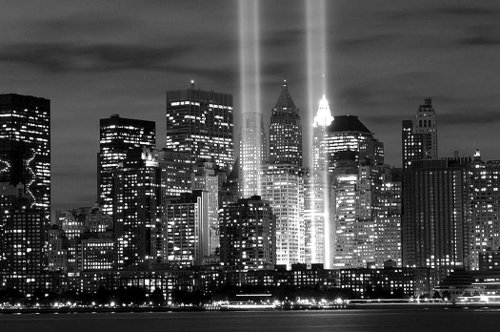
Shadows of 9/11. Nearly a decade since the September 11 events, the United States launched wars in Iraq and Afghanistan, expanded its military operations and ultimately caused human rights violations and destruction. Despite this, the perpetrators remain unknown.
Photo by Denise Gould from Wikimedia Commons
I am not sure that 9/11 changed very much. For a long time, all through its history, the US has been quite different from Western societies in its extremist religious beliefs. The country was founded by religious extremists who were carrying out “god’s divine mission” when they conquered land, exterminated the population and so on and that goes right through American history. There have been repeated periods of revivalism, where there was a huge commitment to extremist religious beliefs. It goes right through the president. People like Ronald Reagan and George Bush were religious fundemantalists-extremists. Their beliefs are shocking.
What has changed is that until about the 1980s, although it was not always there, it was never organised as a political force. In the last 30 years or so, the Republican party has organised it as a political constituency to try to press their own reactionary programmes. That has had a negative effect on American politics and elsewhere in the world. There are danegerous streaks of Islamic fundamentalism and Christian fundamentalism, but nothing like the US.
What are your thoughts about the current role of media especially now that there are new emerging communication tools, in relation to fundamentalisms and social mobilisations?
The internet has become the mechanism for organisation and mobilisation. If you want to organise a political action, you do it over the internet. The internet also provides access to many different opinions and sources. In that sense, it has an enriching effect. But it can also be a generator of cults. Somebody puts up a crazy idea, then 10 other people ride in, then you start inventing facts. Pretty soon you have a movement dedicated to crazy ideas. It has a complex effect.
As far as social mobilisation is concerned, the internet does not take the place of face to face communication. People really need to talk to each other and discuss issues. The internet is much too alienating. It is also a very good tool of propaganda. Of course it is largely dominated by concentrated capital and they can impose propaganda message, that can be inculcated and circulated to naïve isolated people who may believe it.
How about international media? You wrote quite extensively on how it was able to direct public opinion on the Gulf War and the succeeding wars. How has the emergence of new communication technologies sort of nuanced the power of the international media?
The international media has really changed in many ways. So for example, newspapers have far less international coverage than they used to. Take my own city Boston, there was a good newspaper, The Boston Globe – that had international correspondents. That was an independent source but they closed their bureaus so there is a much smaller range of sources. The press has been affected. The press relies on advertising for survival and a lot of advertising have shifted to the internet.
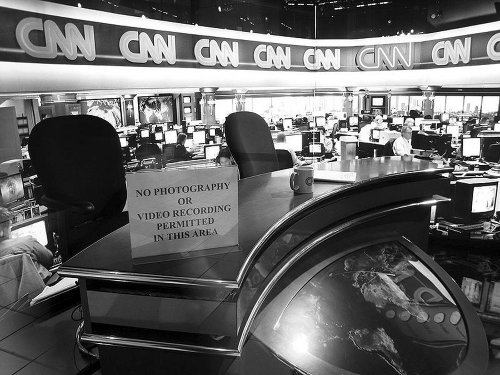
Breaking News. In his book Manufacturing Consent, Chomsky elaborated on the role of the media in shaping public opinion in such a way that it supported US agressions in Iraq and elsewhere. Although the last several years saw dramatic developments in the media especially with the emergence of the internet, access and control remain far from democratic.
Photo from Wikimedia Commons
On the other hand, you can reach many more sources through the internet. But that takes a lot of undertstanding, time, resources, energy and an ordinary person just cannot do that. You would not even know where to look. When you are doing things by yourself, on your own, it is very hard to evaluate what you are getting. You can only evaluate things if you interact with other people to form ideas, reactions and so on. It is hard to estimate.
There are fewer independent sources of information from one point of view, but you don’t have your local newspaper. There are more available theoratically on the internet. Although it is technically feasible to access them, it requires understanding, knowledge, where to look for. So there is no simple answer. It has a complicated impact.
We have also learned that you presented a paper at the United Nations about the responsibility to protect. What do you think of the UN as an institution, as a space for consensus and contestation among its various stakeholders?
The notion of responsibility to protect is a very ambiguous one. There are two versions of it:
In 2005, the UN General Assembly accepted a resolution committing it to responsibility to protect. Actually that was accepted almost unanimously, without any protest from the South. If you take a look at it carefully, it just reaffirms what had already been accepted such as the rights of the child, rights of women and so on and they amount to responsibility to protect. Of course states don’t live up to it but they sign it, so calling for that kind of responsibility is nothing new.
As far as intervention abroad is concerned, the UN resolution restricted it to what had already been accepted, namely that the Security Council can authorise a variety of means, ultimately sometimes the use of force in order to protect the populations that are subjected to genocide, famine and so on. So the 2005 resolution essentially said nothing and therefore was accepted quite easily.
But there is another version that the West supports. In 2001, there was a high-level commission under the authorisation of the UN which produced a report on the responsibility to protect. It was headed by Gareth Evans, former prime minister of Australia and head of an international cirsis group and several other people. Most of the resolution was pretty empty rhetoric but it has hidden in it what the West wants.
Regional groupings and that means NATO, for nobody else can do it, can use force in what they decide to be their area of jurisdiction without the authorisation of the Security Council. That is just old-fashioned imperialism and that of course the South has rejected strongly.
So these are the two versions and there is a great effort to try to confuse them. So many of the ambassadors at the UN, I am sure, don’t even know the difference. But there is a difference.
So the question is: should the UN focus more attention on what is already accepted, namely that states have the responsibility to protect the populations and that the UN Security Council in extreme circumstances can authorise other actions. Or should we accept what the West is trying to sneak in, namely the right of intervention by Western power, maybe the US, maybe NATO. Those are very different notions. The one is perfectly sensible and the other is just a new version of old-fashioned imperialist intervention.
And in fact, the responsibility to protect is applied very selectively. It is applied in accordance to the wishes of the powerful states: the US and its allies. For example, there is no thought of the responsibility to protect the Palestinians, who are a protected people under the Geneva Conventions and therefore a prime responsibility of the UN. There is no thought of protecting them because the US is supporting what is happening to them.
There are a billion people in the world facing starvation. It is possible to protect them, maybe through quite small contributions from the rich countries. But there is no talk about that. In fact, the rich countries who like to talk about the responsibility to protect, are cutting back their food aid, cutting it back so sharply that the UN World Food Programme has been forced to reduce its activities by about 25 per cent. So the responsibility to protect is applied selectively and in accord with the interest of the powerful.
The UN is a good idea. In fact, a large majority of Americans think that the UN, not the US ought to take the lead in international crises. A majority of Americans is even in favour of giving up the veto power of the US in the Security Council. But then that is completely off the agenda. The UN, in practice, can function just as in so far the powerful states primarily the US, permitted to do.
The North Atlantic Treaty Organization (NATO) was founded on 4 April 1949 by countries via a treaty on mutual defence. The latter is highlighted by Article 5, also referred to the “article of faith,” stating that “the Parties agree that an armed attack against one or more of them in Europe or North America shall be considered an attack against them all.”
Its 12 original members are Belgium, Canada, Denmark, France, Iceland, Italy, Luxembourg, Netherlands, Norway, Poland, United Kingdom and United States. In a matter of years, NATO became a global force especially during the Cold War when it substantially allied itself with the US. Its membership gradually expanded after the fall of the Berlin Wall, opening up its roster to Eastern European states which used to be part of the former Soviet Union.
Although Russia is not a member of the alliance, NATO has been cautious towards the country especially when during such crises as Yugoslavia, Georgia and other Balkan states. As a UK Guardian editorial noted, “So although there should be no Russian veto over what alliance Ukraine seeks to join, neither can NATO expand, as it has in the past, in a manner that ignores Russia’s security needs.”
After the September 11 events, NATO invoked for the very first time Article 5 as members offered support to the US. But this moment, particularly the US’ aggression and occupation of Afghanistan, exhibited NATO’s limited capacity. As John R. Schmidt wrote in the Washington Quarterly, “the United States found that European allies had little useful to offer. [The] US rejection of most of the offers ruffled allied feathers and raised questions about the relevance of a military alliance where only one member could project significant, high-end, expeditionary military power.”
Sources: Lobjakas, Ahto (2 April 2009). “NATO At 60: The Alliance’s Article Of Faith.” ; Schmidt, John R. (Winter 2006-2007). “Last Alliance Standing?: NATO after 9/11.” ; and UK
Guardian (14 December 2009). “Russia and NATO: A Frozen Conflict.”
At the current state of the UN as well as the Obama administration, what are your expectations about the ongoing conflicts in Israel and Palestine?
The Obama administration is essentially taking the position of the Bush administration. There is a very broad international consensus, at least a short-term solution, namely that Isreal must withdraw to the international border from the occupation. It must stop carrying out criminal activities in the occupied territories. And then there must be arrangements on border swaps or negotiations and so on. This is the basic international consensus. Everyone agrees to it virtually: The Arab League, the Organisation of Islamic States which includes Iran, Europe, Latin America and others support it. In fact, there has been an overwhelming consensus for 30 years but the US has blocked it. Israel of course, blocks it.
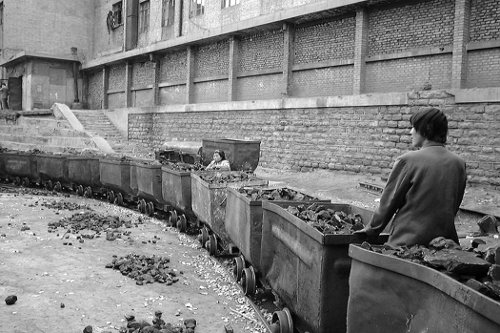
China as the New Rich? Although China is one the most trailblazing economies in the last several years, the country’s capitalism sits on smokestack industries that accrues enormous ecological debts, among others.
In photo is the Jin Hua Gong mine in Shanxi, China by Peter van den Bossche from Wikimedia Commons
So in that case, Israel with US support will continue to take over whatever it wants in the West Bank, leaving the Palestinians scattered and isolated in fragments where they would not be able to have any viable existence. That is exactly what is happening before our eyes, with US diplomatic, military and economic support. Nothing is changing under Obama.
There has been a strong perception that the current economic crisis has weakened the US. Given that, how would you assess the impact of the economic crisis in terms of the US’ military operations especially overseas?
Actually the military budget is not being affected. In fact, the budget is increasing. Obama is substantially increasing the US military action in Afghanistan and Pakistan. Right now the US is establishing new military bases in South America, in Colombia.
Internal to the US, the financial institutions that essentially created the crisis are emerging probably even stronger than before. Now they are consolidating, returning to the practices that led to the crisis.
Economically, of course, the US is weakened by the crisis but just so everybody else. Europe is weakened probably even more. There are few countries who have escaped pretty much unscathed.
One is China because it does not adopt the neoliberal principles so it has much tighter control over their financial institutions. Same is true with India. But these are poor countries.
They don’t affect the military balance. So, yes, the US is weakened but it will emerge from the crisis probably better off. Internal to the US, the financial institutions that essentially created the crisis are emerging probably even stronger than before. They got a huge bail-out from the tax from the public. Now they are consolidating, returning to the practices that led to the crisis: They are paying huge bonuses and making risky loans. The big banks who were responsible [for the crisis] are very happy about it. The leaders of the financial institutions are quite happy with the way things are turning out. They devastated the economy but then they were bailed out by the public and now they are back to the old practices.
What do you think is the strategic nature of Asia, particularly the emerging countries like China and India? What is their role in relation to the US establishment?
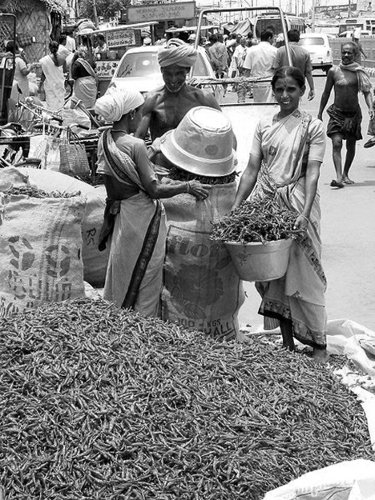
Incredible India? Like China, India is becoming a force to reckon with in the global South. But even as its middle class is multiplying, a large proportion of the population is still under poverty clearance.
Photo by Adam Jones from Wikipedia Commons
It is important to remember that if you go back a couple of centuries, China and India were the commercial and industrial centres in the world. And now to an extent, China and India are partially resuming the position in the world system that they had in the 18th century. But of course, only partially.
China has accumulated very substantial financial reserves. On the other hand, China has hundreds of million people living in destitution. It has enormous ecological problems, many of which are getting worse. Those are in fact debts that are not calculated by economists. But an ecological crisis is a debt that a country will have to pay.
China is a manufacturing platform. On the other hand, a lot of the manufacturing are foreign-owned. If you look at the UN Human Development Index (HDI), China ranks about the 88th among the poorer countries. Nevertheless it is growing rapidly, throwing its weight around. It is a factor in world affairs that it was not 30 years ago.
The US and China have a complex relationship. The US relies on China to fund the enormous debt of the US while China relies on the US to serve as a market for its exports.
Yes, the world is changing. In economic terms, the world is diverse. But in the military dimension, the US is alone. It spends about as much as the rest of the world combined.
As far as India is concerned, it too is developing. A couple of hundred million Indians is rising from poverty but that leaves several hundred million who are mired in poverty. And again, it has enormous internal problems. Just to take the HDI again, India ranks about 130th. There is a sector of India that is becoming quite wealthy, westernised, educated and so on. Although it is large in numbers, it is small in the proportion of India.
The US and India are establishing closer military and economic relations. The US sees India as some sort of a counter to China. But India is diversifying its relations with China.
Yes, the world is changing. In economic terms, the world is diverse. The US, Europe and Asia are approximately comparable economic centres although the US has enormous advantages. But in the military dimension, the US is alone. It spends about as much as the rest of the world combined, much more technologically advanced and has hundreds of military bases. No other country does anything remotely as the US.
What are the challenges for us, developing countries, especially civil society at the moment?
The developing societies have to take their fate into their own hands, not subjugate themselves into the needs and demands of the dominant powers in the world.
Born on 7 December 1928 in Philadelphia, United States, Noam Avram Chomsky is a linguist, teacher, philosopher, author and activist. While he studied at the University of Pennsylvania up his doctorate, he has spent most of his career at the Massachusetts Institute of Technology (MIT), where he is currently Professor Emeritus.
In the field of linguistics, Noam is known for his concept of generative grammar which asserts a universal language, prior to people’s communication with others in a particular society. Among his first books that have been widely acknowledged are Syntactic Structures (1957), which he expanded in the coming decades in other publications such as Aspects of the Theory of Syntax (1965) Language and Mind (1968), The Logical Structure of Linguistic Theory (1975) and Modular Approaches to the Study of the Mind (1984), to name a few.
But it is in the political sphere where he has become more famous, especially with his sharp and straightforward critiques of the United States, especially its foreign policies such as the Vietnam war, the Gulf war, the so-called “war against terror” and the later aggression in Iraq, among many others. He has also written extensively on the international media, its operations and relationship to US interests. American Power and the New Mandarins (1969) is said to contain some of the most powerful arguments against the Vietnam war.
Some of the 70 plus books he has written are “Human Rights” and American Foreign Policy (1978), The Fateful Triangle: The United States, Israel and the Palestinians (1983), Turning the Tide: US Intervention in Central America and the Struggle for Peace (1985), Terrorizing the Neighborhood: American Foreign Policy in the post-Cold War Era (1991), Rethinking Camelot: JFK, the Vietnam War, and US Political Culture (1993), Profit over People: Neoliberalism and Global Order (1999); The New Military Humanism: Lessons from Kosovo (1999), Hegemony or Survival: America’s Quest for Global Dominance (2003), Failed States: The Abuse of Power and the Assault on Democracy (2006).
Meanwhile his books on media include Counter-Revolutionary Violence: Bloodbaths in Fact and Propaganda (1973) and Manufacturing Consent: The Political Economy of the Mass Media (1988), both co-authored with Edward Herman and Media Control: The Spectacular Achievements of Propaganda (1997 and 2002).
His forthcoming book, Hopes and Prospects will be formally launched in March 2010.
Sources: Chomsky.info (nd). “Books.” ; Major Twentieth Century Writers (1991). “Noam Chomsky.” ; Noam-Chomsky.com (nd). “Noam Chomsky.” and Wikipedia (nd). “Noam Chomsky”
 Visualising Power, Documenting Resistance
Visualising Power, Documenting Resistance
Persistently harrassed by the government, Iranian film maker Mahboubeh Abbasgolizadeh has found her mode of resistance in her craft. Her films have not only dealt with women who are oppressed by a fundamentalist regime. Behind the otherwise simple plots are real relations of power, that tells us much about Iran.
Page 2 of 2





 The
The 
 Isis Resource Center holds one of the largest feminist collections of materials in the Global South. With 40 years of publication experience, Isis holds a vast collection.
Isis Resource Center holds one of the largest feminist collections of materials in the Global South. With 40 years of publication experience, Isis holds a vast collection.